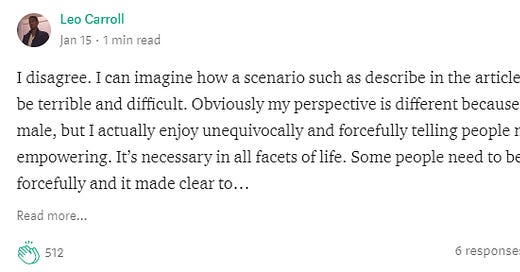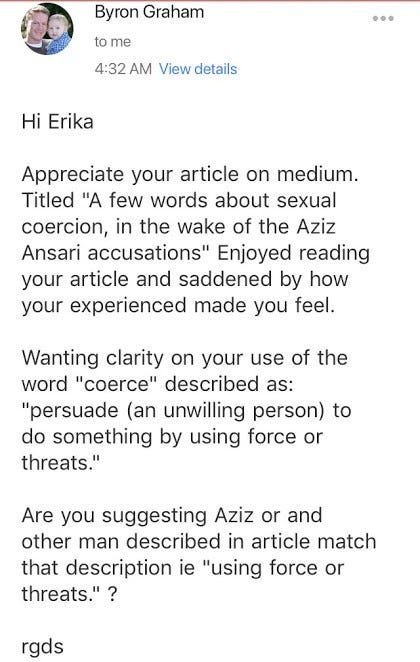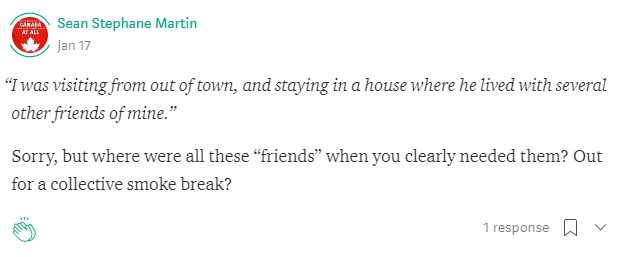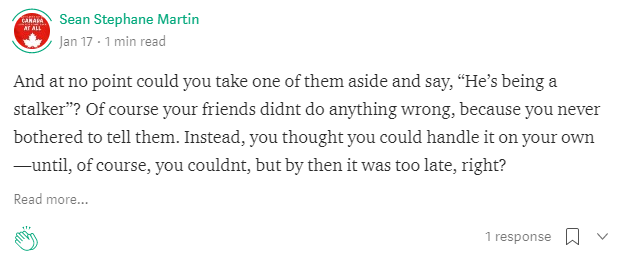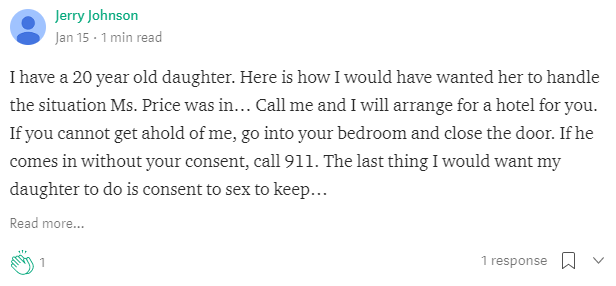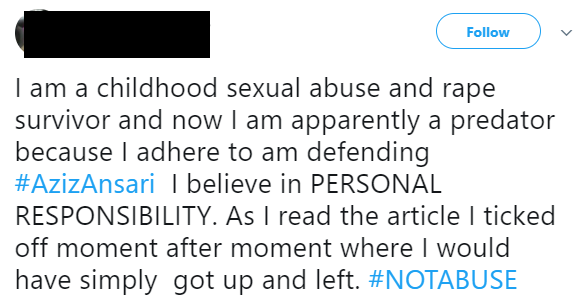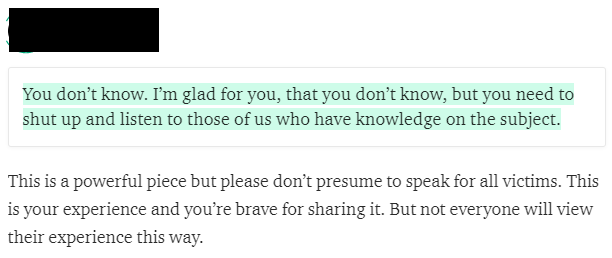Things people want me to know about my sexual assault. Which happened to me. Not to them.
I have written on here about my sexual assault history several times. In a piece about Trigger Warnings from 2016, I discussed an…
I have written on here about my sexual assault history several times. In a piece about Trigger Warnings from 2016, I discussed an ex-partner who stalked me and emotionally abused me. On Saturday, I wrote a piece about someone who used coercive behavior to wear me down and make me assent to sex. I described this incident to make a few points about sexual coercion and how it feels to be worn down into assenting to sex you don’t want. I hoped it would help some people empathize with the anonymous accuser (“Grace”) who came forward about Aziz Ansari putting her through much the same thing.
I experienced my assaults years ago. I’ve written about them privately and discussed them with close friends and a therapist. I’ve processed the incidents and reflected a lot on why they happened, how they affected me, and how I can go about healing in an active way.
I am the number-one expert on my sexual assaults. Nobody else was there, nobody else knows what it was like. And yet. There are a lot of motherfuckers in my Twitter mentions and in the comments trying to tell me how I should feel, what my assaults mean, and how I could have prevented them from happening.
— — —
There are men who have a pretty easy time saying “no” to things, who want me to know I could have just said “no”, too. Never mind that they weren’t there, aren’t me, and don’t know how it feels to say “no” in situations like that. Never mind the fact that I described myself saying no many times. Reading comprehension is not prioritized by a lot of these guys. Listening is not a big skill of theirs.
There are men who want me answer, via email, almost legalistically specific questions about my use of “coerce”, as if the word doesn’t have a variety of definitions in a variety of books. Men who think my encounter did not come with a clear threat of violence, who weren’t there, who don’t know the specifics, who don’t understand how trapped I felt or how often I was touched and moved and held by the man coercing me.
There are men who want to know why I didn’t fight back. Even though I made it pretty explicit why I didn’t, in the piece. There are men who don’t understand why I didn’t scream “NO” at the top of my lungs. Even though I and countless other survivors have explained just how perilous such actions are.
There are men who think it’s suspicious I didn’t enlist the help of my friends during the assault. Who wonder, ineptly, why I behaved as I did. Whose seeming “concern” morphs into blame in a flash.
Even though I have indicated, in the original piece, exactly what my thought process and motivation was.
There are men who tell me exactly what they’d have me to in that scenario, if I was their daughter. I’m not a woman and I’m sure as fuck not their kid, so I don’t know why they’re telling me this shit. I guess it comforts them to imagine me victorious. Confident. A different person than I was at 22.
None of these guys seem to realize how fucking useless their opinions are. How unwelcome. I don’t think I’d tell a rocket scientist how to science rockets better. I sure wouldn’t lecture a brain surgeon about how their last surgery coulda played out, if I’d been there to over see it. When somebody I know gets mugged or flashed or street harassed, I don’t tell them how their sympathetic nervous system ought to have responded. I kinda shut the fuck up because I realize I’m not the center of human experience. But some people just can’t fucking pause to ask themselves if their feedback is relevant, informed, or useful, I guess.
— — — —
There are women who would like me to know that they have been assaulted, and that it was traumatic, but who do not think what I experienced was as bad as what they experienced. They don’t think what “Grace” experienced was as bad as what they experienced either. And they’re mad. For some unclear unarticulated reason. And they need that anger to be heard.

These women need me to know that what happened to them was worse, or that it was something they grimly endured, or that they fought back, so they are better than me and “Grace”. These women think what happened to them is unacceptable, but that what happened to me was my fault, because I’m not them, and I didn’t react the way they did.
They’re angry, I think, that they didn’t receive sympathy when their incident occurred; they’re upset nobody cared and supported them, or that they weren’t permitted to make a fuss and name the person who hurt them.
I can relate to that. I didn’t get attention or sympathy immediately following my assaults, either. But now, with time, and reflection, and help, I have come forward. And I have been treated well and lovingly by a lot of people.
Some of these women have not had such advantages. They haven’t gotten that kind of love. So I guess they think I’m a whiner, or that I’m seeking attention, or that it’s unfair for me to be bathed in support while they still are forced to white-knuckle it through their recovery. It’s true that they deserve all the love and support and attention I got. But I deserve it too. So does “Grace”.
— — — —
There are people who keep thanking me for writing on behalf of all women. For talking about what it’s like to be a woman and to be pressured into having sex. They don’t notice, or don’t understand, that I’m not a woman, even though it’s indicated in my bio twice (“Nonbinary”; “They/Them” pronouns). They call me Ms. or Mrs. or ma’am. They make up a female name for my first initial; call me Emily, based on nothing.
As they describe what my experience means, they use gendered language, not noticing that I never use gendered language in describing rape victims or perpetrators. They cast the world in shadow and light, men and women, ignoring that women can rape, men can be victims, and lots of people are not women or men. They talk about rape as if gender is the only nexus of power, and ignore how race, ability status, class, and sexual orientation are so often involved.
They thank me for being something I’m not. And I’m not mad, I still appreciate the feedback, the compliments, the support. I just wish that my trauma wasn’t used as grounds to misgender me. I wish I didn’t have to be thrown into a category I don’t belong to, for people to find my story relateable. I don’t want my words to be used to silence male or nonbinary survivors. I don’t want to be over-simplified. Misgendering me while thanking me is an insult, wrapped in condolences for an injury, and I cannot reject one without seeming thankless for the other. If I point out how their words can harm other survivors, I risk losing their support entirely.
Some of these people still cannot fathom that men can be raped and women can be perpetrators. That all of this is complex, and that every victim must be respected, every single one.
— — — —
There are people who support #MeToo who think this whole thing is suddenly going too far. They tell me they love the movement, they support it, and they are worried about the backlash. They don’t see that they are, themselves, creating that backlash from the inside. They want their victims white, wealthy, famous, and unimpeachable. They want the crimes to be violent and stark. They cannot handle difficult stories. They lash out at the tellers of those stories.
A lot of these people are women. Nearly all of them, in fact. They have stood up against rape and spoken out against assault, named names even. But something about the passivity and and naivete of “Grace” makes them shut down. They say men are being asked to read minds. They say she didn’t say no. They are ignoring clear places in “Grace’s” story where she rejects Ansari. They say I didn’t do enough either. They were not there. They have no fucking clue. But their confidence is boundless.
I try to tell these people how damaging their words are, how unwanted, how caustic, but they won’t listen. They say they are the ones being attacked. These people who have sought out victims & advocates, to fight with them for hours over Twitter — they say they’re being bullied when the victims and advocates push back. They are loud with outrage. They detract from the movement and its principles. Because they are so so concerned about the movement being sullied.
These people, a minority of commenters, wear me down with grueling replies and nit-picks and insults. They take my story of being worn down into assent, and they wear me down over it. If I give up the conversation, the same way I gave up my consent, they feel victorious. If they re-traumatize me into silence, they feel they have defended the purity of the movement that allowed rape victims to come forward.
— — — —
I’m glad I spoke out. I have received a lot of support, and it has been nourishing. I’m also tired. There are so many people who want to share a hurtful, ignorant opinion for no clear reason. They won’t read, they won’t listen, they won’t step away to process why my story or “Grace’s” story fills them with anger. It makes their thinking sloppy. Their ideas are uninformed, poorly conveyed, uncompelling. And so they will not win out. If they are intentionally obtuse or cutting, I’m wounded by them. If they are unintentionally a bit ignorant, I don’t hold it against them, but I wince.
We are gonna get through this. The bigger, bolder, brighter ideas are going to shine like a beacon and attract people to it. Fuzzy, foggy, shitty ideas are going to disappear into the haze. But damn if it doesn’t suck to wander through that murk.

